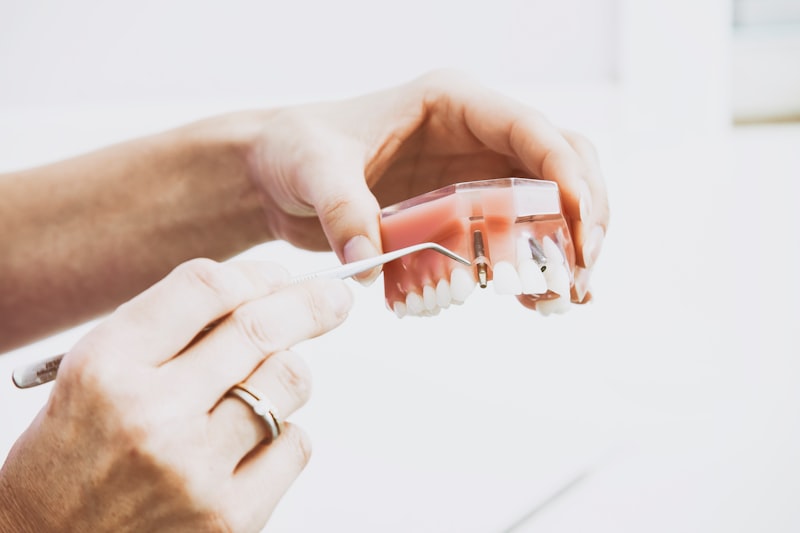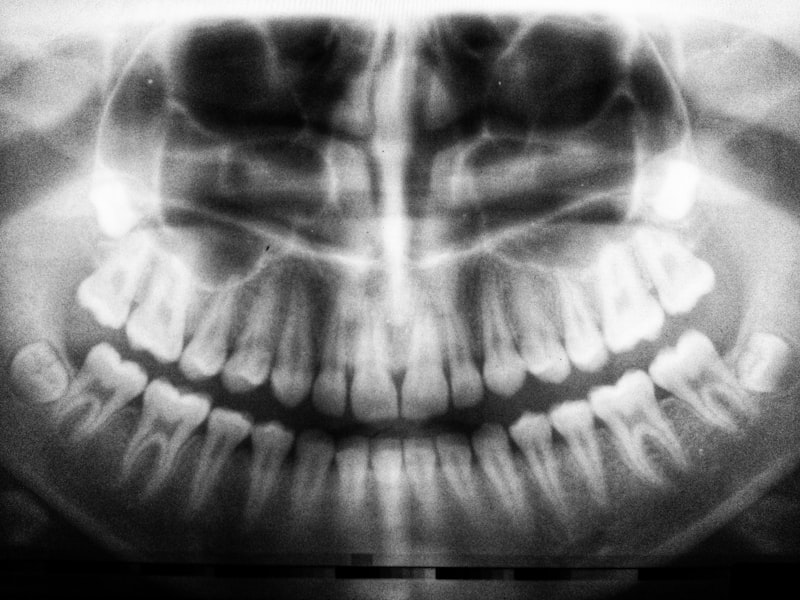Firstly, in case of a toothache, rinse your mouth with warm water and gently floss to remove any food particles that might be causing discomfort. Avoid placing aspirin or painkillers directly on the gums as this can lead to burns. Instead, opt for over-the-counter pain relievers like ibuprofen and schedule an emergency dental appointment promptly.
If a tooth gets knocked out due to an accident, retrieve it by holding it by the crown (top) and gently rinsing off dirt or debris with water, being careful not to touch the root. Try placing the tooth back into its socket if possible, or store it in a container of milk or saliva to keep it moist until you can reach the dentist. Time is critical in such cases, as the chances of successful re-implantation decrease significantly after an hour.
For a broken filling, crown, or orthodontic appliance, save any broken pieces if you can. Cover sharp edges with dental wax or sugarless gum to prevent irritation to the cheeks, tongue, or gums. Contact your dentist immediately to schedule a repair appointment.
In any dental emergency, it’s essential to remain calm and act swiftly. Dental professionals are trained to handle emergencies and can provide the necessary care to alleviate pain and preserve dental health. Remember, early intervention can often prevent more extensive treatments later on.
Handling dental emergencies requires quick thinking and proactive steps to ensure the best possible outcome for your dental health. By knowing what to do in advance, you can be better prepared to handle unexpected dental issues with confidence.
Quick Guide: Handling Dental Emergencies When You Can’t Reach Your Dentist
Toothache Troubles: A toothache can strike at any time, leaving you in discomfort. Start by rinsing your mouth with warm water and gently flossing around the affected tooth to ensure there are no food particles causing irritation. Over-the-counter pain relievers can provide temporary relief. Avoid placing aspirin or any painkiller directly on the gums as it may cause burns.
Dealing with a Knocked-Out Tooth: If you’ve had a tooth knocked out, time is of the essence. Handle the tooth by the crown (top part) and rinse it gently under running water to remove any dirt. Try to place the tooth back in its socket if possible, or keep it moist by placing it in milk or saliva. Seek dental care immediately as the chances of saving the tooth decrease rapidly after an hour.
Managing a Broken Tooth: If you’ve fractured or chipped a tooth, rinse your mouth with warm water to clean the area. Use a cold compress on the outside of the mouth or cheek if there’s swelling. Save any broken pieces and rinse them with warm water. Your dentist will assess the damage and recommend treatment options such as bonding, a crown, or veneers.
Lost Filling or Crown: Losing a filling or crown can expose sensitive tooth tissue and cause discomfort. While waiting to see your dentist, apply a small amount of dental cement or over-the-counter dental adhesive to temporarily reattach the crown or filling. Avoid chewing on the affected side of your mouth until it’s repaired to prevent further damage.
Handling Orthodontic Emergencies: Issues with braces or other orthodontic appliances can also require immediate attention. If a wire is poking or causing irritation, try using orthodontic wax to cover the end temporarily. If a bracket becomes loose, save it and schedule an appointment with your orthodontist for repair.
When to Seek Emergency Care: Some dental issues require urgent attention to prevent complications. If you experience severe bleeding that doesn’t stop, significant swelling of the gums or face, or trauma to the jaw, seek emergency dental care or go to the nearest emergency room immediately.
Navigating dental emergencies can be stressful, but staying calm and taking quick action can help manage the situation until you can reach your dentist. Remember, timely care can often make a significant difference in the outcome of dental emergencies.
Essential Steps: What to Do During a Dental Emergency
When faced with a dental emergency such as a knocked-out tooth or severe pain, acting promptly is crucial. Start by assessing the situation calmly. If a tooth has been knocked out, handle it carefully by the crown (top part) and avoid touching the root. Rinse it gently with milk or saline solution if dirty, but do not scrub or remove any attached tissues. Attempt to place the tooth back into its socket, if possible, and hold it in place by gently biting down or using moistened gauze.
Pain from a dental emergency can be intense. Over-the-counter pain relievers like ibuprofen can help alleviate discomfort until you can see a dentist. Applying a cold compress on the outside of the mouth or cheek near the affected area can also provide temporary relief from swelling and pain.
If a tooth is chipped, cracked, or fractured, rinse your mouth with warm water to clean the area. If there is bleeding, apply gentle pressure with gauze for about 10 minutes or until the bleeding stops. Use a cold compress to minimize swelling and see your dentist as soon as possible to prevent further damage or infection.
If something gets lodged between your teeth, try to gently remove it with dental floss. Avoid using sharp objects that could damage your gums or teeth. If you are unable to remove the object with floss, see your dentist promptly to prevent irritation or infection.
Certain situations require immediate attention from a dentist. These include severe toothache, dental abscess (swelling with pus), continuous bleeding from the mouth, or injuries to the jaw. Ignoring these symptoms can lead to complications, so it’s important to seek professional help promptly.
Remember, quick action and proper care can significantly improve outcomes during a dental emergency. By following these essential steps and seeking professional dental care promptly, you can protect your oral health and ensure a speedy recovery.
Expert Advice: Managing Tooth Pain Until You See a Dentist
Firstly, rinse your mouth with warm saltwater. This simple solution can help reduce inflammation and cleanse the affected area. Mix half a teaspoon of salt in a glass of warm water and swish it around your mouth for about 30 seconds before spitting it out. This can provide temporary relief from pain caused by swelling or irritation.
Another effective method is applying a cold compress to the outside of your cheek. This can numb the area and reduce swelling. Wrap a bag of ice or a cold pack in a cloth and hold it against the painful area for 15-20 minutes at a time. This can also help alleviate any throbbing sensations associated with the toothache.

Over-the-counter pain relievers such as ibuprofen or acetaminophen can provide temporary relief from tooth pain. Follow the dosage instructions carefully and do not exceed the recommended amount. These medications can help reduce inflammation and pain until you can visit your dentist for a proper evaluation and treatment.
Avoiding very hot or very cold foods and drinks can also help minimize tooth sensitivity and pain. Stick to lukewarm or room temperature items to prevent aggravating the discomfort further.
If you suspect your toothache is caused by debris lodged between your teeth, gently floss around the affected tooth to remove any trapped particles. This can sometimes resolve minor pain and discomfort associated with food particles irritating the gums or tooth.
Remember, these are temporary measures. It’s crucial to schedule an appointment with your dentist as soon as possible to diagnose and treat the underlying cause of your tooth pain. Ignoring dental pain can lead to more severe issues down the road, so prompt professional care is essential for maintaining your oral health.
Emergency Dental Care: Tips for Immediate Relief and Action
Experiencing a dental emergency can be distressing, but knowing how to handle it can make all the difference. Whether it’s a sudden toothache or a broken tooth, immediate action is crucial for relief and prevention of further complications.
Firstly, assess the situation. If you’re in pain or notice swelling, it’s essential to contact your dentist right away. Many dental practices reserve slots for emergencies, ensuring you receive prompt care. Meanwhile, you can alleviate discomfort by rinsing your mouth with warm saltwater to reduce inflammation and applying a cold compress to the outside of your cheek.
For a knocked-out tooth, time is of the essence. Handle the tooth by the crown (the top part), avoiding touching the root. Rinse it gently with water if dirty, but do not scrub or remove any attached tissue fragments. Try to reinsert the tooth back into its socket, holding it in place using a clean cloth or gauze. If this isn’t possible, keep the tooth moist by placing it in a container of milk or saliva while en route to the dentist.
In cases of a cracked or broken tooth, rinse your mouth with warm water to clean the area. Apply a cold compress to minimize swelling and take over-the-counter pain medication as needed. Avoid chewing on the affected side and stick to soft foods until you receive professional care.
Remember, dental emergencies can happen unexpectedly, but staying prepared and knowing what to do can ease anxiety and promote swift recovery. By taking immediate action and seeking professional dental care promptly, you can increase the chances of saving your tooth and preserving your oral health.
From Home Remedies to Professional Care: Navigating Dental Emergencies
When faced with a dental emergency, the first step is often trying home remedies to alleviate immediate pain. Rinsing with warm salt water can help reduce swelling and cleanse the affected area. Over-the-counter pain relievers like ibuprofen can provide temporary relief until professional care is available. However, these remedies are stopgaps; they don’t address underlying issues.
For more serious emergencies such as a knocked-out tooth, prompt action is critical. If possible, gently place the tooth back in its socket and hold it there. If this isn’t feasible, store it in a container of milk or saliva—never water—to keep it moist until you reach a dentist. Time is of the essence, as the chances of saving the tooth decrease rapidly after it’s dislodged.
Professional dental care is essential for addressing emergencies comprehensively. Dentists have the expertise and tools to diagnose and treat the root cause of the issue. Whether it’s severe pain, swelling, or trauma to the mouth, they can provide immediate relief and prevent further complications.
Remember, prevention is often the best strategy. Regular dental check-ups can detect potential issues early, minimizing the risk of emergencies. Maintaining good oral hygiene—brushing twice a day, flossing, and using mouthwash—can also prevent many dental problems from arising.
While home remedies can offer temporary relief for dental emergencies, seeking professional care is crucial for long-term oral health. By knowing how to respond swiftly and effectively, you can navigate dental emergencies with confidence and ensure the best possible outcome for your dental health.
Understanding Dental Emergencies: When to Seek Urgent Treatment
Do you know when your toothache qualifies as a dental emergency? Understanding dental emergencies and knowing when to seek urgent treatment can make a significant difference in preserving your oral health.

Imagine this scenario: you bite into something hard and feel a sharp pain shoot through your tooth. Is it just temporary discomfort or a sign of something more serious? Dental emergencies often arise unexpectedly, from severe toothaches to knocked-out teeth or broken dental appliances. The key is knowing when to act swiftly to prevent further complications.
A dental emergency typically involves sudden and severe pain, swelling, or bleeding in the mouth. If you experience any of these symptoms, it’s crucial not to ignore them. Prompt treatment can alleviate pain and prevent potential long-term damage to your teeth and gums.
Timing is critical in dental emergencies. Waiting too long to seek treatment can worsen the condition and may require more extensive procedures later on. Whether it’s a cracked tooth from a fall or a lost filling causing sensitivity, immediate attention from a dentist can often save the tooth and relieve discomfort.
Think of your teeth as the guardians of your smile and overall well-being. Just as you wouldn’t hesitate to seek medical help for a sudden illness, prompt action in dental emergencies is equally vital. Your dentist is equipped to handle urgent cases and can provide the necessary care to restore your oral health.
Recognizing the signs of a dental emergency and acting promptly can make all the difference in preserving your teeth and gums. Don’t hesitate to contact your dentist if you experience severe tooth pain, swelling, or any unusual symptoms in your mouth. Your proactive approach today could save you from more complex dental issues tomorrow.
Preparedness Matters: Steps to Take Before Dental Emergencies Occur
When it comes to dental emergencies, being prepared can make all the difference between a stressful situation and a manageable one. Imagine this: you’re enjoying a weekend getaway or a cozy evening at home when suddenly, a sharp toothache strikes. Panic may set in, but with a few proactive steps, you can be ready to handle such emergencies calmly and effectively.
Firstly, having a trusted dentist is crucial. Regular dental check-ups not only maintain your oral health but also establish a relationship with a professional who knows your dental history. This familiarity can be invaluable during an emergency, as your dentist will have immediate access to your records and can provide tailored advice over the phone.
Secondly, assembling a dental emergency kit is a proactive measure. Include items like sterile gauze, a small container with a lid (for preserving knocked-out teeth), over-the-counter pain relievers, and an oral pain reliever recommended by your dentist. This kit acts as your first aid in case of unexpected dental issues.
Next, familiarize yourself with basic dental emergency procedures. Knowing how to handle a knocked-out tooth, a broken crown, or a severe toothache can mitigate pain and prevent further damage until professional help is accessible. Quick actions can sometimes save a tooth that might otherwise be lost.
Additionally, understanding your dental insurance coverage and policies related to emergency care is essential. Dental emergencies can sometimes be costly, but knowing what your insurance covers and how to navigate emergency services can alleviate financial concerns during stressful times.
Lastly, maintain good oral hygiene habits. Prevention is the best approach to avoid dental emergencies altogether. Brush and floss daily, and attend regular dental check-ups. A healthy mouth is less prone to sudden issues that could lead to emergencies.
Frequently Asked Questions
What steps should I take for a broken tooth?
Learn the essential steps to take when dealing with a broken tooth, ensuring immediate care to minimize pain and prevent further damage. Follow these clear guidelines for prompt relief and effective treatment.
What should I do if I knock out a tooth?
If you knock out a tooth, it’s important to act quickly and correctly to maximize the chance of saving the tooth. Immediately pick up the tooth by the crown (top part), avoiding touching the root. Rinse it gently with milk or saline solution if dirty, but do not scrub or remove any attached tissue. Try to reinsert the tooth into the socket, holding it in place with gentle pressure or store it in milk or saliva. Seek emergency dental care within 30 minutes for the best chance of successful re-implantation.
How can I relieve pain from a dental abscess?
Learn effective methods to relieve pain from a dental abscess quickly and safely. Discover proven home remedies and when to seek professional dental care for optimal relief.
How do I manage severe toothache at home?
Learn how to manage severe toothache at home with effective remedies and practices. Discover immediate relief strategies using household items and natural remedies to alleviate pain until you can see a dentist.
What constitutes a dental emergency?
A dental emergency encompasses severe tooth pain, a knocked-out tooth, or an injury to the mouth causing bleeding. Any condition requiring immediate attention to save a tooth, alleviate severe pain, or stop bleeding qualifies as a dental emergency.


